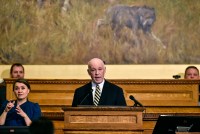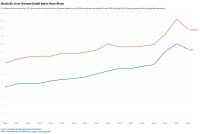Latest Morning Briefing Stories
Timeline: The Final Years of the Campaign to End Smallpox
Many people working in global health thought eradicating smallpox was impossible. They were wrong. Season 2 of the Epidemic podcast, “Eradicating Smallpox,” is a journey to South Asia during the last days of variola major smallpox. Explore the timeline to learn about significant dates in the final push to end the virus.
Epidemic: The Goddess of Smallpox
To defeat smallpox in South Asia, public health workers had to navigate the region’s layered cultural ideas about the virus. They also dreamed big. In Episode 1, host Céline Gounder wonders how the U.S. might tap into similar “moral imagination” to prepare for the next public health crisis.
In Older Adults, a Little Excess Weight Isn’t Such a Bad Thing
Researchers have found that while obesity at any age risks harming health, a few extra pounds in later life isn’t cause for concern.
Readers and Tweeters See Ways to Shore Up Primary Care
KFF Health News gives readers a chance to comment on a recent batch of stories.
How a Combination of Covid Lawsuits and Media Coverage Keeps Misinformation Churning
Even as the covid-19 pandemic wanes, litigation — whether about vaccines, masks, or a range of other public health policies made during the pandemic — isn’t about to end.
A Plan to Cut Montana’s Medicaid Waiting List Was Met With Bipartisan Cheers. Then a Veto.
Republican Gov. Greg Gianforte’s veto disappointed and bewildered those seeking to address low-income residents’ long wait for assisted living or in-home care.
What the Health? From KFF Health News: The Long Road to Reining In Short-Term Plans
President Biden made good on a campaign promise this week with a proposal that would limit short-term health insurance plans that boast low premiums but also few benefits. Meanwhile, the Supreme Court’s decision to outlaw affirmative action programs could set back efforts to diversify the nation’s medical workforce. Alice Miranda Ollstein of Politico, Amy Goldstein of the Washington Post, and Rachel Cohrs of Stat News join KFF Health News’ chief Washington correspondent Julie Rovner to discuss these issues and more. Also this week, Rovner interviews KFF Health News’ Bram Sable-Smith, who reported the latest KFF Health News-NPR “Bill of the Month” about how a hospital couldn’t track down a patient, but a debt collector could.
Got Milk in School? Farmers Fight Health Advocates Over the Creamy ‘Whole’ Variety
It has been over a decade since whole milk was served in schools through the National School Lunch Program, after U.S. government dietary guidance effectively banned it. But dairy farmers, some health experts, and members of Congress say it’s time to bring it back.
An Arm and a Leg: Wait, What’s a PBM?
Pharmacy benefit managers, or PBMs, are companies that negotiate the prices of prescription drugs. Hear about their role in raising drug prices and the ongoing efforts to regulate this complex industry.
Excessive Drinking During the Pandemic Increased Alcoholic Liver Disease Death Rates
The number of Californians dying from alcoholic liver disease rose dramatically in the last decade, sped by the pandemic.
Groups Sue to Overturn Idaho ‘Abortion Trafficking’ Law Targeting Teens
It is illegal to help a minor obtain an abortion in Idaho or leave the state for one without parental consent. The lawsuit says the ban infringes on the right to interstate travel and First Amendment freedoms.
As Nonprofit Hospitals Reap Big Tax Breaks, States Scrutinize Their Required Charity Spending
Nonprofit hospitals avoid paying taxes if they provide community benefits such as charity care. More states are examining that trade-off, scrutinizing the extent of hospitals’ spending on their communities.
Mental Health Respite Facilities Are Filling Care Gaps in Over a Dozen States
As three years of pandemic stress accelerated an ongoing nationwide mental health crisis, peer respite programs diverted patients from overburdened emergency rooms, psychiatric institutions, and behavioral therapists. Now, more “respites” are opening.
Meet the People Deciding How to Spend $50 Billion in Opioid Settlement Cash
As settlement dollars land at the state level, state councils wield significant power in determining how the windfall gets spent. And, though they will likely include the most knowledgeable voices on addiction, these panels also face concerns about conflicts of interest and other issues.
Proposed PFAS Rule Would Cost Companies Estimated $1B; Lacks Limits and Cleanup Requirement
A proposed Environmental Protection Agency rule calls for companies to disclose PFAS manufactured or imported since 2011. The chemical industry is upset because such compliance would cost an estimated $1 billion, while environmental health advocates worry because the rule wouldn’t ban the chemicals outright.
What You Need to Know About the Drug Price Fight in Those TV Ads
At least nine bills introduced in Congress take aim at pharmacy benefit managers, the powerful middlemen that channel prescription drugs to patients.
Idaho Drops Panel Investigating Pregnancy-Related Deaths as US Maternal Mortality Surges
Amid a years-long rise in maternal mortality rates in the United States, Idaho lawmakers decided to disband a committee created to investigate pregnancy-related deaths.
‘It Was a Bloodbath’: Rare Dialysis Complication Can Kill, and More Could Be Done To Stop It
A venous needle dislodgment is a rare dialysis complication that can kill a patient in minutes. Some experts worry those who treat themselves at home are at increased risk.
Medi-Cal’s Fragmented System Can Make Moving a Nightmare
When Medi-Cal beneficiary Lloyd Tennison moved last year from Contra Costa County to San Joaquin County, he was bumped off his managed care plan without notice before his new coverage took effect. His case highlights a chronic issue in California’s fragmented Medicaid program.
California Promises Better Care for Thousands of Inmates as They Leave Prison
California officials recently agreed to give new parolees a 60-day supply of their prescriptions and promised to replace lost medical equipment in the month after they’re released from prison. The state also agreed to submit Medi-Cal applications on their behalf at least 90 days before they are released.


























